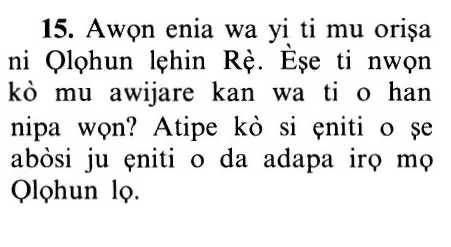18vs15
Select any filter and click on Go! to see results
هَؤُلَاء قَوْمُنَا اتَّخَذُوا مِن دُونِهِ آلِهَةً لَّوْلَا يَأْتُونَ عَلَيْهِم بِسُلْطَانٍ بَيِّنٍ فَمَنْ أَظْلَمُ مِمَّنِ افْتَرَى عَلَى اللَّهِ كَذِباً
Haolai qawmuna ittakhathoo min doonihi alihatan lawla yatoona AAalayhim bisultanin bayyinin faman athlamu mimmani iftara AAala Allahi kathiban
Click to play
Yoruba Translation

Hausa Translation
"Ga waɗannan mutãnenmu sun riƙi waninSa abin bautãwa! Don me bã su zuwa da wata hujja bayyananna a kansu (waɗanda ake bautawar) ? To, wãne ne mafi zãlunci daga wanda ya ƙãga ƙarya ga Allah?"
Asbabu n-Nuzuul (Occasions of Revelation)
هَؤُلَاء قَوْمُنَا اتَّخَذُوا مِن دُونِهِ آلِهَةً لَّوْلَا يَأْتُونَ عَلَيْهِم بِسُلْطَانٍ بَيِّنٍ ...
These, our people, have taken for worship gods other than Him (Allah). Why do they not bring for them a clear authority!
meaning, why do they not produce some clear evidence and genuine proof for their behavior!
... فَمَنْ أَظْلَمُ مِمَّنِ افْتَرَى عَلَى اللَّهِ كَذِبًا ﴿١٥﴾
And who does more wrong than he who invents a lie against Allah.
They said: `but by saying that they are lying transgressors.'
It was said that when they called their king to believe in Allah, he refused, and warned and threatened them. He commanded them to be stripped of their clothing bearing the adornments of their people, then he gave them some time to think about the situation, hoping that they would return to their former religion.
This was a way that Allah showed kindness for them, because during that time they managed to escape from him and flee from persecution for the sake of their religion.
This is what is prescribed in the Shariah during times of trial and persecution -- a person who fears for his religion should flee from his persecutors, as was reported in the Hadith:
يُوشِكُ أَنْ يَكُونَ خَيْرُ مَالِ أَحَدِكُمْ غَنَمًا يَتْبَعُ بِهَا شَعَفَ الْجِبَالِ وَمَوَاقِعَ القَطْرِ يَفِرُّ بِدِينِهِ مِنَ الْفِتَن
Soon there will come a time when the best wealth any of you can have will be sheep, which he can follow to the tops of the mountains and places where rain falls, (fleeing) for the sake of his religion from persecution.
In such cases, it is allowed to seclude oneself from people, but this is not prescribed in any other case, because by such seclusion one loses the benefits of congregational and Friday prayers.
These young men were determined to flee from their people, and Allah decreed that for them, as He says about them,
" هؤلاء قومنا اتخذوا من دونه آلهة لولا يأتون عليهم بسلطان بين " أي هلا أقاموا على صحة ما ذهبوا إليه دليلا واضحا صحيحا " فمن أظلم ممن افترى على الله كذبا " يقولون : بل هم ظالمون كاذبون في قولهم ذلك فيقال إن ملكهم لما دعوه إلى الإيمان بالله أبى عليهم وتهددهم وتوعدهم وأمر بنزع لباسهم عنهم الذي كان عليهم من زينة قومهم وأجلهم لينظروا في أمرهم لعلهم يرجعون عن دينهم الذي كانوا عليه وكان هذا من لطف الله بهم فإنهم في تلك النظرة توصلوا إلى الهرب منه والفرار بدينهم من الفتنة وهذا هو المشروع عند وقوع الفتن في الناس أن يفر العبد منهم خوفا على دينه كما جاء في الحديث " يوشك أن يكون خير مال أحدكم غنما يتبع بها شغف الجبال ومواقع القطر يفر بدينه من الفتن " ففي هذه الحال تشرع العزلة عن الناس ولا تشرع فيما عداها لما يفوت بها من ترك الجماعات والجمع فلما وقع عزمهم على الذهاب والهرب من قومهم واختار الله تعالى لهم ذلك وأخبر عنهم بذلك .
"هؤلاء" . مبتدأ "قومنا" عطف بيان "اتخذوا من دونه آلهة لولا" هلا "يأتون عليهم" على عبادتهم "بسلطان بين" بحجة ظاهرة "فمن أظلم" أي لا أحد أظلم "ممن افترى على الله كذبا" بنسبة الشريك إليه تعالى قال بعض الفتية لبعض
أي قال بعضهم لبعض : هؤلاء قومنا أي أهل عصرنا وبلدنا , عبدوا الأصنام تقليدا من غير حجة .
I'raab - grammatical analysis of the Qur'an
«هؤُلاءِ» الها للتنبيه أولاء اسم إشارة في محل رفع مبتدأ «قَوْمُنَا» خبر ونا مضاف إليه والجملة استئنافية «اتَّخَذُوا» ماض والواو فاعله «مِنْ دُونِهِ» متعلقان بمحذوف حال والهاء مضاف إليه «آلِهَةً» مفعول به والجملة حالية «لَوْ لا» حرف تحضيض «يَأْتُونَ» مضارع مرفوع بثبوت النون والواو فاعل «عَلَيْهِمْ» متعلقان بيأتون «بِسُلْطانٍ» متعلقان بيأتون «بَيِّنٍ» صفة «فَمَنْ» الفاء استئنافية ومن اسم استفهام في محل رفع مبتدأ «أَظْلَمُ» خبر والجملة صلة «مِمَّنِ» من اسم موصول في محل جر ومتعلقان بأظلم «افْتَرى » ماض فاعله مستتر «عَلَى اللَّهِ» لفظ الجلالة مجرور بعلى متعلقان بافترى «كَذِباً» مفعول به والجملة صلة الموصول
